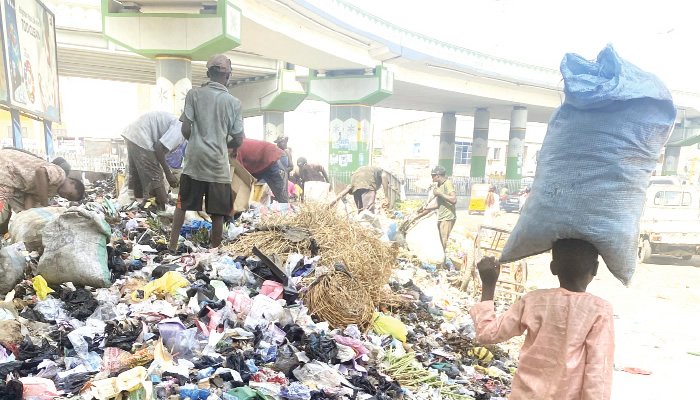DEBORAH TOLU-KOLAWOLE writes on the struggles of underage out-of-school children who work as refuse collectors, popularly referred to as bola-bola on the streets of Kano, the Kano State capital
For many children in Nigeria, even before they are old enough to embrace the beautiful feelings that come with childhood, they are forced to become adults. Having to make important decisions and take responsibility. One of the culpable culprits responsible for the theft of childhood is child labour.
Child labour, manifesting in its many malignant forms ensures that children stop being children even before many of them are old enough to really understand and enjoy what it means to be a child. Child labour it is that ensures for example that children who should be in school getting equipped to take the world by storm are instead marooned in places where they are subjected to conditions alien to their age or aptitude.
A report by the United States Department of Labour on child labour and forced labour reports in Nigeria suggests that 47.5 percent of children living in Nigeria aged five to 14 years old are part of the working population as of 2021. The report also noted that 39.9 percent of those between ages seven to 14 combine work and schooling.
In 2021, Nigeria made “moderate” advancements in efforts to eliminate the worst forms of child labour. Accounting for over 15 million child labourers according to the International Labour Organisation, the Federal Government through the Ministry of Labour, employment and Productivity validated the National Action Plan for the Elimination of Child Labour (2021-2025).
The government also created a new programme to provide vulnerable households with seed capital to fund new businesses in areas with high rates of child labour.
However, like other policies of the government, efforts to reduce the high rate of child labour seemed to have hit the bricks. Children have been in the worst forms of labour, though the Federal Government in 2003 under the administration of former president, Olusegun Obasanjo introduced the Child Rights Acts which prohibits underage children from labour, most northern states including Kano, popularly regarded as the economic capital of the north did not adopt the act until the early part of 2023. Though the Kano State Government under the administration of the immediate past governor, Abdullahi Ganduje approved the law on May 23, 2023, after years of trying to amend the rights act to suit the Sharia law, our correspondent who went around some areas in Kano observed that underage children were much more involved in work activities, particularly during school hours.
Eleven-year-old Abubakar Abdullahi is a testament to the consistent failure of the government to follow through with the implementation of its policies.
From age seven, the young boy started working as a refuse collector on the streets of Kano. The refuse collection business, popularly referred to as “bola-bola” in the Hausa language seemed to be one of the best businesses for underage children in the state. All they had to do was to collect refuse and take it to refuse collection points.
Though the “job” seemed not harmful, our correspondent observed that these underage children mostly between the ages of eight-17 years who were meant to be in school worked mostly during the mornings.
It didn’t matter to young Abubakar that his age-mates were in school acquiring the knowledge that would set them apart and place them on the path to greatness in the years to come. He simply wanted to “survive” and help his family.
The son of a father who is a traditional medicine seller and a mother who is a food seller. Abubakar who is the first child of six children, spends most hours of the day on the streets of Kano.
The young boy who spoke to our correspondent in Hausa through the aid of an interpreter at around 10:30 am, said, “Every day when I come out, I can make like N1,000 per day. I have some customers, so every morning I go to their houses and pick the refuses. If I don’t get there on time, another person would have gone there to pack the dirt and I will have to look for another customer. I make multiple trips in a day so that I can be able to get enough money. There are some people that I throw refuse for them but they will give me food.
“My father sells traditional medicine while my mother sells food. I am the first of six children. I work because I want to help my mother and my father. I have not acquired Western education but I go to Islamiyah in the evening. My mum and I attend the same Islamiyah in the evening.”
Maybe Abubakar’s life would have charted another course had he has been opportune to have been born into a home where parents understood the effects of child labour and the need to allow him to exercise his right to education as enshrined in the Child rights act, 2003 of the Federal Republic of Nigeria.
Maybe like some of his other contemporaries, Abubakar would have been in school learning and preparing for a bright future had the government followed through with the implementation of its laid down policies on child labour.
“I don’t know what I want to be in the future.”, a confused Abubakar told this reporter when he was asked what he wanted to be in the nearest future.
Abubakar knew his guns in the refuse collection business. A few minutes after speaking to our correspondent and the interpreter, he moved on to a potential customer. After a few minutes of haggling, he was paid N200 to carry a pile of refuse. Though the pile seemed too much for an 11-year-old, he seemed excited to have been able to negotiate a good deal with his customer.
UNICEF reported that as of January 2022, at least 10.5 million children, or one-third of all Nigerian children, are out of school in Nigeria, making it the highest out-of-school rate in the world. The UN organisation also noted that states in North-West and North-East Nigeria have just primary net attendance rates of 47.7 percent and 47.3 percent respectively.
Although free and compulsory education is federally mandated by the education act, little enforcement of compulsory education occurs at the state level, school fees are often charged in practice with the cost of materials prohibitive for most families. Apart from this, the high rate of poverty, according to the US Department of Labour, forced most underage children out of school, leaving them on the streets as workers in other to earn incomes and support their families.
However, by early 2023, UNESCO noted that the number of out-of-school children had increased to over 20 million. Though the Nigerian government disputes this, experts in the education sector noted that UNESCO’s statistics were based on children aged 6-18 years while the government only focused on children aged 6-11 years.
The reason for that is not far-fetched, the Nigerian law does not recognise that working children from 12-18 are engaged in child labour. In fact, the Child Rights Act of 2003 section 59 sets the minimum age for child employment at 12, this negates the international labour law which says that the minimum age for employment is 18 years.
Although Nigerian government forbids the employment of youths under the age 18 in any work that is hazardous to their health, safety, or morals, it does not establish the types of hazardous activities that are prohibited to working-class children under the age of 18.
In 2013, the National Steering Committee for the Elimination of the worst forms of child labour developed a report that identified hazardous child labour in Nigeria; however, the government has yet to determine by law or regulations the types of hazardous works prohibited for children.
A few minutes after moving away from Abubakar, this reporter encountered another young boy. He looked hungry and tired. With an oversized but dirty lemon-green jersey, and dirty legs that seemed not to have had encounters with soap and water in days, 12-year-old Abubakar Ibrahim carried a huge sack and walked on the streets of Atiken, Sabon Gari in Kano State.
He had multiple hand bands popularly called “rubber bands.”
Seeing his condition, our correspondent offered him three pieces of N50. As he thanked our correspondent and prepared to forge ahead with his journey, our correspondent through the interpreter asked what he was doing on the streets during school hours.
He said, “I collect refuse and I help people to throw them away. I also sweep people’s shops and houses. There are times that the people I sweep for would have swept before I get there so what they will do is they will give me the refuse to go and throw away. I make about N500 per day. My father has a minor job while my mother stays at home with us. I have not started school at all because I have to support my family.’’








